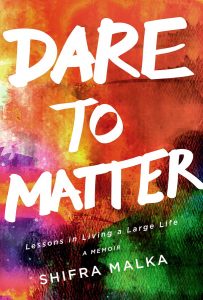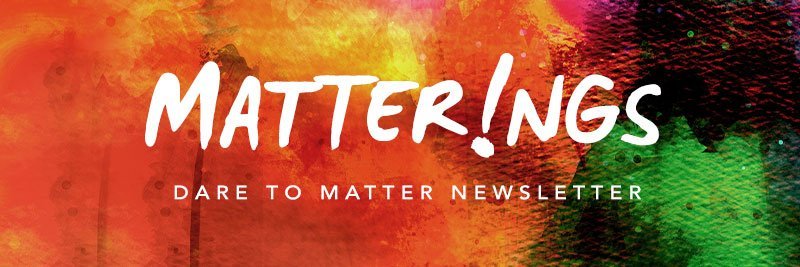I know. That’s not how this question usually sounds. Authors are supposed to answer – are expected to answer – the opposite: Why Did You Write This Book?
The one-sentence answer: I started out writing a different book; not this one that ultimately became a memoir, consisting of 340 pages of a deeply personal story.
So how does something like that happen? How does the delightful book you are writing, featuring your favorite interviews from a live radio program about social and educational initiatives you produced and hosted, do something unexpected like that?
Turns out, books have a mind of their own … just like the main character in Dare to Matter whose complex, quirky nature features prominently throughout. This book put up a good fight. It definitely had to work hard to get me to write it. And it taught me, a debut author, something experienced authors already know: You do not own the page; the page owns you. Should you try turning your hand away, it will find a way to get you back to the page to do its bidding.
Chapter Five is a great example; money was the topic. I had no intentions of discussing personal reflections about money in my life. But, money talks, and in my book, it cost me an entire chapter, Money: A Currency of Mattering.
This book was beginning to feel like a difficult, strong-willed child. This book-child just kept running ahead of me, making me chase it breathlessly. It wasn’t following my script; children often don’t. And just as intimidated parents might decide not to have more children, after raising a particularly challenging child – “our family’s big enough after all” – I decided now was a good time to stop the project.
I have a process for (not to mention, a history of) stopping a project. First, I called husband Zack, whose legendary husbanding features prominently in the story. “I had no intention to write what I just wrote. I am done. I can’t go back to it.” I then called upon my believing, even-tempered story editor Ben with training in mental health, who drew on both skillsets to re-assemble the undone pieces of a psyche agitated by truths deeper than it was prepared to find and offer. Brenna, my older sister and important character in the book, did not escape this ongoing struggle without my phone call begging her for permission to stop.
Ultimately, an unexpected Heavenly nod prodded me onward. A relative offered me her used laptop that she had just replaced. With that, I began frequenting the world of writing in cafes. I would not ever return to my desktop computer. Now I’d have a way to travel past, and overcome, resistance. The smells and sounds of the coffee shop camaraderie would lure me into its environs. I’d take my book-child with me, cuddled in my laptop. She’d open up to me, and before I knew it, my book-child and I would be conversing. Soon, she’d even have me talking for her, doing her bidding. Children are powerful in that way, having their honest say with a relaxed, unsuspecting adult. So are those smells and tastes of pleasure that the coffee shop offered me for less than $5 every day.
Then came Chapter 7, A Smattering of Mattering. This narrative about womanhood went way beyond the call of this author’s duty, and comfort. It called me back so many times, like a child supposed to be going to sleep, asking for “just one more cup of water, please, just one more.” Every time I thought I was finished with her, she’d snag my attention and not let me go … quite similar to what I used to do to Brenna every day as an anxious fourth-grader terrified to go to class, making her late for hers.
“Throwing in” the pen – to give up, to opt out – was a tempting option all along. It still is. Except for one thing: this is what my whole story was about. There was hardly anything more natural for me than to insist that “this doesn’t matter anyway.” And then there was that comment from a distant relative with whom I had shared, against my better judgment, that I was writing this book, “What is so important about your life that you’d write a whole book about it, no less a memoir?” A hotter fire couldn’t have been lit beneath my fatigued, fickle fingers.
Can you now understand why, when recently asked in an interview, “What was the hardest thing you had to cut from your book, your favorite ‘dead darling’,” I said: “It wasn’t what I had to cut from the book that was painful… it was what I had to leave in.”
Is it all a big mistake? Let the final chapter’s opening quote by author Douglas Adam answer: “I may not have gone where I intended to go, but I think I have ended up where I intended to be.”


